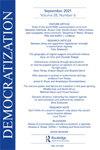在危机中,制度重要吗?制度类型和应对Covid-19的果断措施
IF 2.9
1区 社会学
Q1 POLITICAL SCIENCE
引用次数: 0
摘要
世界各国政府一直在采取措施遏制COVID-19大流行并缓解其经济影响,但它们出台新政策的速度和程度存在很大差异。本文探讨了政权类型在决定政府应对冠状病毒大流行及其溢出效应的政策果断性方面所起的作用。我们假设,由于“自由承诺”,民主政权可能会更慢地引入对公民自由的限制,而由于“福利承诺”,民主政权可能会更快地提供经济保护。我们使用事件历史分析和牛津COVID-19政府反应跟踪器的数据来研究民主程度较低的政权是否更有可能更快地实施限制,更慢地实施支出计划。与预期相反,我们的研究结果表明,与更民主的政权相比,更专制的政权并没有更快地实施限制或更慢地支出。这一发现适用于各种制度措施和模型规格。本文章由计算机程序翻译,如有差异,请以英文原文为准。
Do institutions matter in a crisis? Regime type and decisive responses to Covid-19
ABSTRACT Governments around the world have been implementing measures to contain the COVID-19 pandemic and ease its economic fallout, and there has been extensive variation in the speed and extent to which they have introduced new policies. This article examines the role that regime type plays in determining the decisiveness of government policies to tackle the coronavirus pandemic and its spill over effects. We hypothesize that democratic regimes may be slower to introduce restrictions on civil liberties due to a “freedom commitment” and may be faster to provide economic protections due to a “welfare commitment”. We use event history analysis and data from the Oxford COVID-19 Government Response Tracker to examine whether less democratic regimes are more likely to implement restrictions faster, and spending programmes slower. Contrary to expectations, our findings suggest that more authoritarian regimes do not implement constraints more quickly or spending more slowly than more democratic regimes. The finding holds across various regime measures and model specifications.
求助全文
通过发布文献求助,成功后即可免费获取论文全文。
去求助
来源期刊

Democratization
POLITICAL SCIENCE-
CiteScore
6.40
自引率
12.50%
发文量
73
期刊介绍:
Democratization aims to promote a better understanding of democratization - defined as the way democratic norms, institutions and practices evolve and are disseminated both within and across national and cultural boundaries. While the focus is on democratization viewed as a process, the journal also builds on the enduring interest in democracy itself and its analysis. The emphasis is contemporary and the approach comparative, with the publication of scholarly contributions about those areas where democratization is currently attracting considerable attention world-wide.
 求助内容:
求助内容: 应助结果提醒方式:
应助结果提醒方式:


